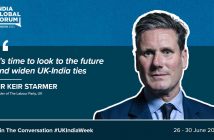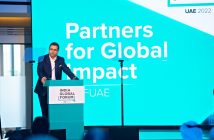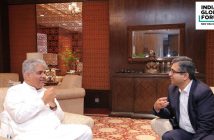The Eurozone was looking like a very gloomy place a month ago. The clouds have still not dispersed. But I would like to remind everyone of one of Maya Angelou’s famous quotes: “Courage is the most important of all the virtues because without courage, you can’t practice any other virtue consistently.”
Decisive and strategic measures were needed, and indeed taken, by the ECB this September. How will they shape the future of Eurozone? Only time will tell. Today, the whole of the EU needs courage more than anything else to face this financial crisis. As they say, the night is always darkest before the dawn. But I am an optimist. I can see that the current crisis like any other crisis has opened a window of opportunity for increase in bilateral trade between the EU and India.
1. India’s largest trading partner
As one of the fastest growing economies in the world, India today has all the required trappings to take the global stage. Indian companies are looking to expand their global footprint. Indian businesses from a variety of sectors like ICT, auto, and renewable energy have already established their presence in the EU. Indeed two years ago, I founded the online news channel, India Inc, in order to capture the rapidly unfolding story of the globalisation of Indian business.
I would like the numbers to speak for themselves. The EU is India’s largest trading partner. It accounts for nearly 14 per cent of India’s foreign trade. And I must mention the 2 million strong Indian diaspora now spread across all countries of the EU, which serve as bridge builders between this continent of great nations and India.
But with every opportunity there comes a challenge. Indian businesses like many, many European businesses are facing the heat of the current financial crisis. In some quarters Africa and South America are emerging as more favorable investment destinations. Also the pending free trade agreement (FTA) between the EU and India is an issue we must push to resolve.
2. A match of equals
The EU is one of the largest sources of FDI for India by investing around €3 billion in 2010. Moreover, the EU received FDI of around €600 million from India in the same year. Indian investments in the EU are mainly focused in the UK, Germany, France and the Benelux countries (Belgium, Netherlands, and Luxemburg).
In terms of jobs creation, the UK attracted 81 projects, generating 5,454 jobs in 2011-12 alone; in turn, making India the fifth-largest investor in the country. This is from a position of virtually nowhere 10 years ago. The partnership between India and the EU is genuine and it’s truly becoming a match of equals.
Case in point: the Tata Group. As the UK’s largest automotive employer, JLR employs nearly 24,000 people of which 8,000 were added in the last two years. Apart from JLR, the Tata Group also has interests in 19 other European companies including Tata Hispano in Spain, steel plants in Netherlands and TKM global logistics offices in Germany.
3. Job creators, not job takers
Indian prowess in the ICT sector is known the world over now. IT firms like TCS and Infosys plan millions in additional investments in their core northern European markets and are planning to hire hundreds more in Europe this year. In the current business environment, especially in the EU, the need to be increasingly competitive will grow as companies seek the most economically efficient solutions and this is what Indian IT companies can offer them.
A Deutsche Bank study with 55 major IT decision makers in Europe found that Indian companies TCS and Wipro were the most favoured vendors amongst all vendors. Indian IT companies also have near-shore centers in countries like Hungary, Poland, Portugal and Romania. The EU accounts for about 20-30 per cent of Indian IT revenues, a large portion of which comes from the UK. The major investments of India’s IT giants in Europe clearly demonstrate that Indians are not job takers – they are job creators.
Renewable energy is a major area of growth for India-EU relations – India is already the fifth largest producer of wind power. Suzlon, India’s largest wind turbine manufacturer, is a major success story in this area; its European subsidiary REpower Systems has bagged major orders of approximately 276 MW capacity across Italy, France, Germany, Poland and the UK this year alone.
However, the most important major development in recent times is the ‘big bang’ reforms announced by the Indian government in multi brand retail, aviation and media services. By opening up FDI in multi-brand retail, India’s $450-billion retailing industry is about to undergo a big change. Aviation and media services also present huge opportunities for EU companies which possess immense technological expertise. There may be huge reservations to these reforms, some of which I can understand. But the fact is that after years of plodding from one crisis to another, at last the Indian government has started to take decisions.
It is probably the right time that the EU revisits the huge opportunity that trade with India promises. The current economic crisis has left its impact on Indian companies operating in the EU. According to a FICCI study on the Ongoing Economic Scenario in Europe and its Impact on Indian Industry, a majority of Indian companies which are doing business in or have invested in the EU have been adversely impacted by the economic crisis, with 73 per cent of those surveyed saying they have lost 20 per cent or more of their business. Worse, 60 per cent of the surveyed companies expect the current economic situation to continue for the next two-three years. Most of the Indian companies surveyed have already begun to look beyond the EU. They are contemplating to seek opportunities in Africa, the Middle East and South Asia. This is not such a terrible thing if both Indian and European companies see the benefits of joint collaboration and taking the best of both into third country markets.
4. Economic foresight and political will
Another major overhang is the pending FTA between Indian and the EU which, according to European Commission President Jose Manuel Durao Barroso, will be the “single-biggest free trade agreement in the world”. Benefits to both economies are conservatively estimated in the range of €9-€19 billion. The two sides have yet to reach an agreement on key sectors like insurance, auto, generic pharma and agriculture and non-agriculture products. Since 2007 negotiations have been going on and are expected to reach a conclusion in the next India-EU summit in February 2013.
Germany’s ambassador to India, Michael Steiner, expects the deal to be concluded in the next summit. Even Belgium’s Deputy Prime Minister and minister of foreign affairs Didier Reynders had made a strong pitch for an early conclusion of the free trade agreement between India and the EU, saying it would significantly boost two-way trade and investments.
Clearly there is momentum. The question is whether there is collective economic foresight and political will to make it happen.
5. We’re in the same boat – let’s make it sail
There is a lot that India and EU share in common and yet both are different in many ways. The synergistic benefits of the EU’s technological knowhow and India’s manufacturing as well as services expertise can go a long way in tapping the increasingly appetising African and South American markets. For instance, the resources rich African markets provide an excellent opportunity to both EU and Indian companies in the fields of manufacturing, oil and gas, ICT, auto and distribution.
In conclusion, at MLS Chase we advise many European companies investing in India and Indian companies coming into Europe. We can still see the appetite in our clients despite these turbulent times. The future for trade between the EU and India looks promising as more and more Indian companies are exploring investment opportunities in mainland Europe.
It must be said that though prior to 1991 India as a country was somewhat insular, Indians have always been internationalist.
There is a sanskrit saying Vasudhaiva Kutumbakam – the whole world is one family. The EU is a family of nations. India appreciates and respects this, and there is more that can be done to bring nations together, not only through trade but also through culture and sport.
I would like to end with a famous quote from Martin Luther King Jr: “We may have all come on different ships, but we’re in the same boat now.” So let’s make it sail.







